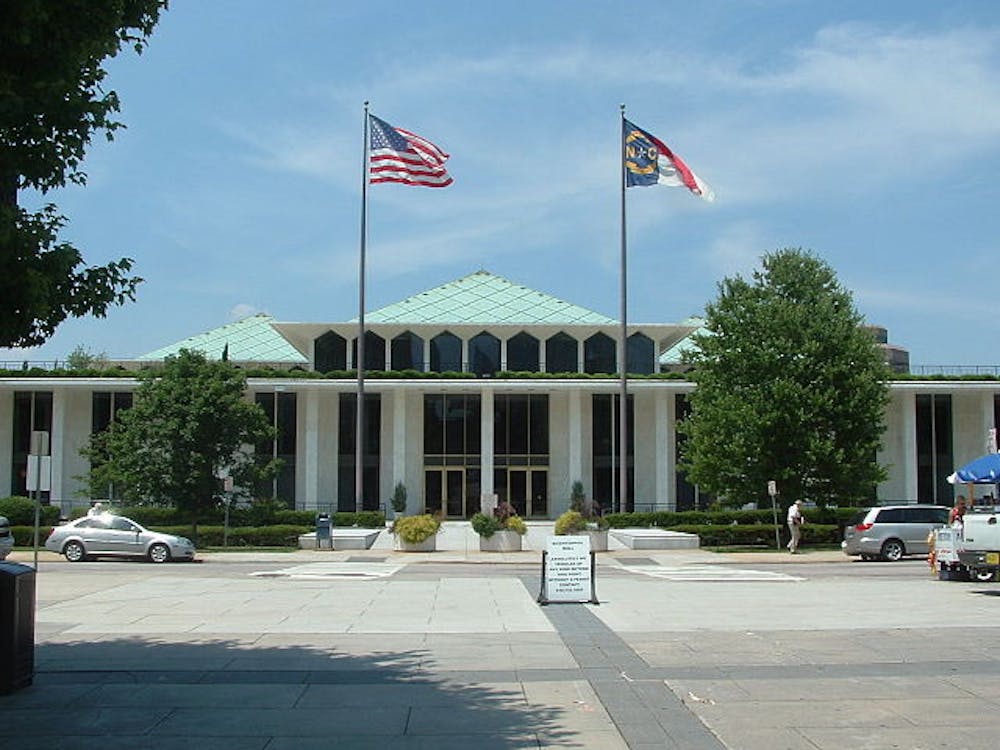The North Carolina General Assembly has moved several notable bills closer to N.C. Gov. Josh Stein’s desk since he entered office in January, ranging from stripping N.C. Attorney General Jeff Jackson of his power to sue the federal government to making Election Day a state holiday.
The bills vary in bipartisan support, with one shortening the number of early voting days and another legalizing permitless concealed carry projected to fall down party lines in both chambers.
Reducing the attorney general’s power
Jackson could soon see his power to sue President Donald Trump — which he has done four times since taking office — stripped under S.B. 58.
The state Senate successfully pushed the bill through an initial 28-17 party-line vote, although Democrats objected to a second required vote taking place immediately after. The final vote also fell along party lines 29-19, with all Republicans present voting “Aye” and all Democrats present voting “No.”
The bill is now in the hands of the state House, where the GOP is one seat short of a veto-proof supermajority.
Civil rights advocacy organizations have opposed the bill, and Stein is widely expected to veto it. Republicans have accused Jackson of using the attorney general’s powers for purely political purposes, while Democrats contend that its provisions would remove recourse from harmful executive actions.
Before Jackson took office, Republicans passed a bill barring the attorney general’s office from arguing in court that any of the General Assembly’s laws or actions are unconstitutional.
Looser gun restrictions
Two bills — H.B. 5 and S.B. 50 — would allow North Carolinians aged 18 and older to carry concealed guns without a permit and make now-mandatory gun training voluntary. The House version contains an additional provision that would allow elected officials to carry concealed guns while acting in an official capacity.
"The General Assembly has made incredible strides to defend the Second Amendment rights of North Carolinians,” wrote the Senate bill’s sponsors in a joint statement. “… We need to join the majority of states and recognize that law-abiding citizens should be able to exercise their Second Amendment rights without getting permission from the government."
Twenty-nine other states have similar “constitutional carry” laws on the books. House Speaker Dustin Hall has said that Republicans will likely move on the House’s version soon.
Neither bill has found support from Democrats and would likely fall to Stein’s veto pen.
Democrats have countered with S.B. 161, the Jenesis Firearm Accountability Act, which would tighten gun control laws by requiring lost or stolen firearms and ammunition to be reported within 48 hours. Gun owners who do not comply, particularly repeat offenders, would be subject to fines or criminal charges. The bill is considered unlikely to pass.
An Election Day holiday?
H.B. 31 proposes that statewide general election days become paid holidays for state employees. The bill has received bipartisan support from over 60 House members and has been referred to committee.
Early voting days cut
North Carolinians could see the number of early voting days reduced under H.B. 66, which would move the first day of in-person early voting from the third Thursday before an election to the second Monday preceding Election Day.
Fourteen Republicans are sponsoring the bill, with no Democrats joining. It was referred to committee on Feb. 6.
IVF access
Get The Chronicle straight to your inbox
Sign up for our weekly newsletter. Cancel at any time.
Eight Republicans are cosponsoring H.B. 76, which would bar the state or any government entity from blocking patient in vitro fertilization (IVF) or other “assisted reproductive technology” access.
The bill would also prevent government intervention in health care providers’ attempts to provide IVF treatment. It has been referred to the House’s rules, calendar and operations committee, after which it will be sent to a different committee for edits.
Honorable mention: Speed limits
H.B. 112 would increase the maximum speed limit on interstates from 70 to 75 miles per hour. If passed, the bill would make North Carolina the 20th state to have a maximum speed limit of at least 75 mph. Nevada and South Dakota have the highest limits in the country at 80 mph.
The bill was referred to committee after its first reading last month.
Samanyu Gangappa is a Trinity sophomore and local/national news editor for the news department.

